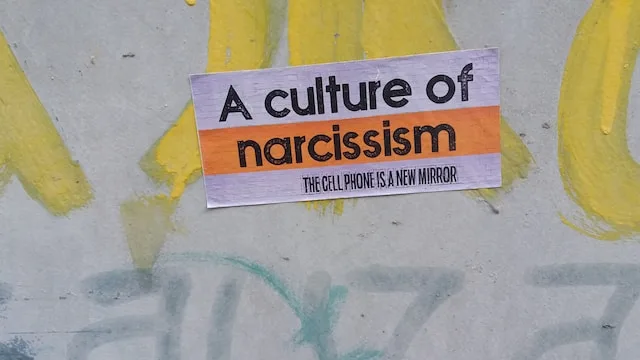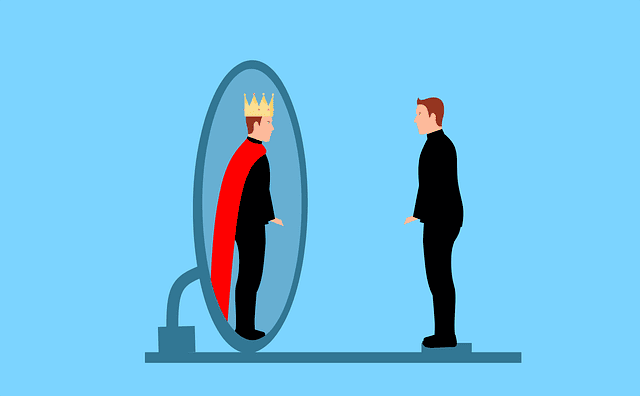Narcissism is a grave personality disorder where a person gets extremely self-centered and develops an unrealistically high perception of their own importance. Narcissists are used to putting on a false facade of their importance and self-confidence.
Self-love or narcissism?
Being confident about yourself and self-love can be important to live a carefree and happy life, But anything in excess can also turn into something excessively toxic. We often meet people who are extremely self-centered and overconfident about themselves and it’s almost frustrating.
Loving oneself to a limit where one becomes extremely self-obsessed, to the point where one starts to disparage others is however not what we call “self-love”. This can be a sign of a serious mental issue.

Understanding narcissistic persona
People with this condition have no empathy for others. They only care about how they feel. They might never consider the opinions or choices of anyone except for themselves, and neither do they care about anyone’s feelings. These people want everyone to praise them all the time so they feel good. They need constant appreciation even when they don’t deserve it. The worst of all, they always think so highly of themselves that in the process they can bring anyone down.
Narcissists can be tricky. You might not know you’re dealing with one until you’re drained of all the positivity, peace, and happiness. They leave you questioning your worth. But there are always certain ways and signs that can help you identify narcissists among people and these signs can be your cue to stay away from them.

Symptoms
Traits of peak narcissism behavior include
Gaslighting: Narcissists believe that whatever they do or say is right. even when they hurt someone with their inappropriate behavior, they will always play the victim. When things don’t go their way, they start Gaslighting and manipulating people.
Controlling nature: They are awfully controlling, it’s always “my way or highway” for them. They never accept anything if it’s not their way. No matter what the consequences. They can never take no for an answer.
No sense of empathy: They can never understand how other people feel. They are mostly inconsiderate and careless. It’s simply impossible for them to be there for others. They’re not even sorry after doing terrible things because, in their mind, it was the right thing to do.
Attention seeking: Narcissists need constant appreciation and attention. When deprived of it, you might not see them at their best behavior. They surround themselves with the people they can easily manipulate. They want people to do everything for them but when it’s their turn to make an effort they opt out. They abandon anyone who is not doing enough for them. Relationships with a narcissist can be completely one-sided, where you give and give but never get anything in return.
Egoistic and arrogant: They put their ego ahead of anyone and Everything. They think they’re incapable of making mistakes and even when they’re at fault they never take accountability for their actions. They can never face the horrible things they do so you can expect them to simply disappear from a situation they created instead of fixing it.
Demeaning others: They find joy when they see someone is miserable and they do everything in their power to make them feel worse about their situation. They judge people for their choices. They also like to bully people and defend it by saying things like ” I’m kidding ”, ‘ ‘I didn’t mean it like that ” and, “You’re overreacting to a joke”. They will insult and belittle others to keep an unreal and delusional image of themselves alive.
Superiority complex: They think no one is better than them. This complex can be about anything like their looks, talents, personality, and manners. They think they are best in everything they do and they are incapable of making mistakes. They have this self-created idea of perfectionism About themselves, that can’t be brought down.
Competitive: It’s okay to be competitive but for a narcissist, almost everything is a competition. They bring it into their personal lives, with their loved ones, all sorts of relationships. In every situation, either they win or lose. And if they lose they might get dangerously aggressive.
Rage: Narcissists are usually very angry people. Anything that tries to drag them back to reality from their fantasy world can make them furious. They live in a made-up delusional world far away from bitter realities, so they don’t have to face their insecurities, their bad habits, and wrongdoings.

Causes
Though it is a problem that can pass genetically, it highly depends on how a person is raised. His/Her upbringing makes a lot of difference. Childhood experiences and traumas can fuel this problem even more. Good parenting can do wonders at the same time bad parenting causes way too much damage. Everything should be balanced, way too much criticism is as toxic as unnecessary and constant appreciation. So it highly depends on the environment you live in. These factors can make a person develop narcissistic traits, which only get worse with time.
Relationship with a Narcissist
The most challenging part is to tackle your romantic relationship with people with narcissistic personalities. They can be extremely hard to deal with. You find yourself giving and giving till you’re left with nothing. Gradually, you will realize that your relationship is making no progress because your partner is willing to make no effort for you.
Meanwhile, they expect you to do everything for them and the minute you decide to stop, they attack you with unnecessary outrage and tantrums. They are never interested in making things better, fixing the relationship, or working on their shortcomings. But they need their partner to be perfect in everything they do otherwise it’s a problem.

Not just romantic relationships, but other connections are also very difficult. Narcissistic influence tends to ruin your life in ways you can’t even imagine. If you have one narcissist around you in your family, it will almost ruin things for the rest of the household. It will create a Tough and demanding situation, making it harder to survive.
So if you’re dealing with a narcissist in your family, workplace, in a romantic relationship, or in friendships, just know you’re in big-time trouble.
Damage caused by Narcissistic Influence
As much as narcissists are toxic to themselves, they are way more toxic to other people. They are capable of ruining lives. They make people question their worth. They play the victim and make others feel bad about something they did. They demotivate and devalue others to the point where they give up on everything. They are so perfect with their little mind games, they know exactly how to wrap someone around their finger.
They live in a lie, everything is perfect for them till their tiny little bubble of perfection bursts and they have no other option but to face what they actually are. This leaves them with a feeling of never-ending emptiness and tons of insecurities.
Even while they live in their world of pretty fantasies, they lose what matters. It affects their relationships in the worst way possible. They lose so much till they’re only left with themselves. After all, it was just one unreal self-distorted image of perfection.
Avoiding narcissistic abuse
Once you realize that you have been a victim of a narcissist, you should start working on how you deal with them. Never give them benefit of a doubt. Don’t let yourself down for them. Most importantly, never fall for their tricks.
The best way to save yourself from all this toxicity is to cut off narcissists right away. Unless they’re willing to work on themselves and they realize where the problem is. If cutting someone off Is impossible, make sure you set boundaries that will save you from getting hurt in the future.

As for the people suffering from this disorder, they should seek professional help. This is a serious problem and can be hard to overcome. It is important to develop compassion and empathy for other people and keep on trying to do better. Yet the best thing to do is to find professionals who can help you overcome this personality disorder through counseling and therapies. Healing takes time.
Self-awareness is not self-centeredness, and spirituality is not narcissism. ‘Know thyself’ is not a narcissistic pursuit.
Marianne Williamson

Pingback: Navigating Toxicity: 6 Telltale Signs of Dealing with a Toxic Person - techinnovatorhub.com
Hello,
How are you, hope you are well.
What kind of sites do you want to buy today, tell me your terms and conditions and I will get you the sites of your choice very soon.I hope we can do a good job. I will find the sites that you need and save you and my time. And I will try my best to give you the sites at the best price.
I am waiting for your reply.
Thanks
Pingback: Unmasking Narcissism: Understanding the Complexities of a Narcissistic Personality – Visual Therapy Online
Pingback: Gentle Parenting: Effective Parenting Style
Pingback: Relational Aggression: Silent Harm in Social Circles